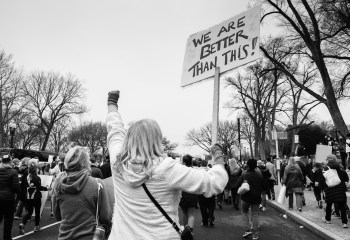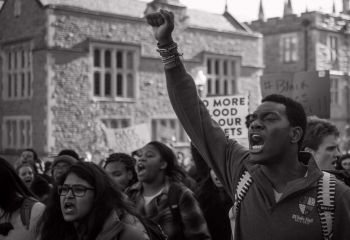
Free speech tensions include fear of what others might hear
On May 5, 2020, Gallup and Knight Foundation released a new report on college students and their attitudes about Free Speech. Jane Bambauer shares insights below. View the full report and additional insights here.

Knight Foundation’s fascinating report about college students’ views of campus climate is a treasure trove of insights about the near future of free speech. Most of the seeming contradictions (for example, that 81% of students support a campus environment where students are exposed to all types of speech, yet 78% believe racial slurs should be banned) can be resolved with some nuance or justified flexibility of otherwise strong speech protections. But buried in the seeming trade-offs between the discomfort of underrepresented groups and the reticence of political conservatives are hints of something else.
The survey shows that students don’t seem worried that hateful or wrongheaded views will change their own beliefs as much as they worry that their peers will be affected. That lack of faith in other listeners is a threat to the core tenets of American free speech. Healthy discourse requires some amount of trust that others are able to sort out bad arguments and make good counter-arguments in the process.
The sociologist W. Phillips Davison coined the term “third-person effect” to describe the presumption — the fear, really — that others will be more negatively influenced by communications than you will. And over several decades, a mountain of evidence has accumulated that supports the theory. Most people believe that others spend more time on Facebook and are more psychologically damaged than they are, and that others are more duped and more negatively influenced by rap lyrics, violent video games, advertising and political campaigns too. This, rather than direct feelings of threat and harm, may explain why students have a tolerance for censorship through both social pressure and official university policy.
Figure 9 of the Gallup-Knight report provides the most direct evidence that third-person effects play a significant role in campus culture. Seventy-eight percent of students reported that they do a good job of seeking out and listening to viewpoints different from their own, but only 45% reported that other students at their college did a good job. More students feel they are more discerning listeners compared to their fellow students.
There is another clue in the responses related to social media. More than half of the students agreed that social media stifles free expression because too many people block views they disagree with, yet 68% of students believe social media companies should aggressively remove posts that violate their standards for appropriate content. Students trust the content standards of Facebook more than they trust the standards of each other.
This suggests that perhaps, when 38% of students reported that they have felt uncomfortable about something that was said in reference to their identity group, the discomfort was not the loss of kinship and safety they felt about the speaker, but rather the lack of trust they have in other listeners. Surely this must be part of the explanation for the shocking 32% of student Democrats who favor restrictions on the expression of political views. Fear of the persuasion of others lurks in these data. The First Amendment has placed a bet that individuals will sift through facts and arguments not perfectly — nowhere near perfectly — but well enough. More importantly, free circulation of ideas is superior to the suppression of honest disagreement except in unusual circumstances. While reasonable minds will debate, forever, about the bounds of those “unusual circumstances,” a university campus populated with students that come prepared with what Hugo Mercier calls “vigilant open-mindedness” is not one of them.
Jane Bambauer is a professor of law at the University of Arizona.
Photo (top) by Philippe Bout on Unsplash
Recent Content
-
Journalismarticle ·
-
Journalismarticle ·
-
Journalismarticle ·









